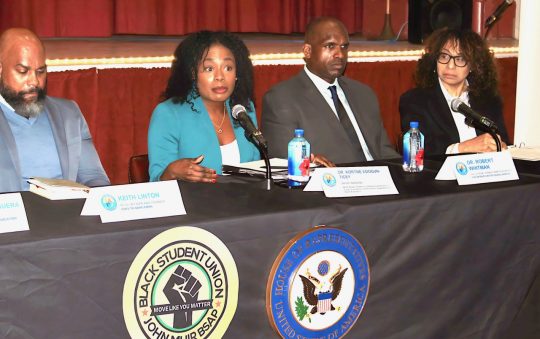
July 31 marked the end of Mental Health Observance Month, but for Rayshell Chambers and others, the importance of mental health goes far beyond one month, especially in the Black community.
During a recent interview with the L.A. Sentinel, Chambers talked about the importance of fostering better health outcomes for all mental health patients, but particularly among African Americans.
For example, she said, only one in three Blacks who need mental healthcare actually receives it. Despite the increased focus on mental health, racial disparities persist in diagnosis, access to culturally responsive care, and treatment settings, she said.
Chambers is the co-founder of Painted Brain, a peer run mental health organization. Her personal experiences, like being hospitalized and losing a sister to an accidental overdose, led her on the mental health journey. She was recently appointed to the California Mental Health Services Oversight and Accountability Commission. She is also a member of the newly formed Community Health Equity Alliance.
“[CHEA] is a network of providers including the organization I co-founded,” Chambers explained.
“There’s also the California Council of Community Behavioral Health Agencies, and the California Institute for Behavioral Health Solutions, in collaboration with Janssen Neuroscience. These are all Black-led organizations or initiatives that help strengthen our resources in California relative to mental health services for Black adults.
“Particularly we’re coming together in having forums and listening sessions as well as developing tools for the support of our providers in connecting our residents particularly our Black residents to mental health services within our own agencies and regions. Because as you know, although Blacks can utilize the services, our outcomes are particularly poor especially when it comes to mental health.”
One of the tools that the group is developing is the Journey Map, available soon and will guide those who are seeking it to health resources in their area.
According to Mental Health America (mhanational.org): “Overall, mental health conditions occur in Black and African American (B/AA) people in America at about the same or less frequency than in White Americans. However, the historical Black and African American experience in America has and continues to be characterized by trauma and violence more often than for their White counterparts and impacts emotional and mental health of both youth and adults.
“So really the conversation is addressing those barriers relative to access, relative to poor outcomes, relative to stigma issues,” Chambers said.
The group has also developed a podcast called “The Unapologetic Black Unicorns” where they focus on the work of Black leaders in mental health.
“We highlight the work of Black psychiatrists, Black peer supporters, and advocates,” she said.
Lastly, Chambers talked about California’s 988 crisis hotline, for mental health patients released July 16.
“Now, if you or someone you know is having a mental health crisis, you can call 988 instead of 911,” Chambers explained, adding that it could help law enforcement, for example, come into a situation more informed.
In December, President Joe Biden’s administration announced a $284 million infusion to upgrade infrastructure and fortify call centers nationwide. In California, officials promised an additional $20 million to the 13 public and private call centers that respond to hotline calls, “so we can meet Californians where they are and expand resources and support during these difficult times,” Gov. Gavin Newsom said in a statement.
To learn more about Chambers, mental health resources, and her organization, visit paintedbrain.org.






